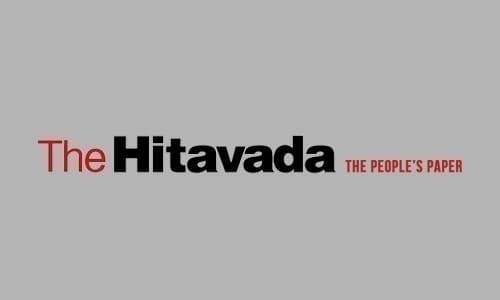B’desh At Political Crossroads
| Date :19-Nov-2023 |

By Salah Uddin Shoaib Choudhury
IN THE aftermath of Indian Prime Minister Narendra Modi’s significant visit to the United States earlier this year, there was widespread anticipation for a notable strengthening of relations between Delhi and Washington. However, there seems to have been an oversight by key policymakers in India regarding the Biden administration’s strategic manoeuvres, which were aimed at leveraging the alliance with the world’s largest democracy to serve American geopolitical interests in countering China and solidifying US dominance in the region.
Modi’s vision for an enhanced Indo-US relationship to counter China’s influence in South Asia appears to have collided with America’s true intentions. The US seems inclined to position India as a secondary ally, potentially compromising Indian national security to further its own regional dominance.
Recent actions by the Biden administration in South Asia, notably the destabilisation of Afghanistan and potential influence in Pakistan’s trajectory, now pivot towards a new objective – reshaping Bangladesh’s political landscape. There are allegations that the US seeks to support the Bangladesh Nationalist Party (BNP), alongside other Islamist forces like Jamaat-e-Islami (JeI), to return to power through upcoming elections or other means. This shift in focus has triggered widespread concerns over the potential repercussions for Bangladesh, a country with a population of 170 million.
Simultaneously, this evolving situation has led to increasing discord between India and the United States, particularly concerning their perspectives on Bangladesh’s elections and democratic practices.
Observers have noted India’s sharp disagreement with the US approach, accusing Washington of attempts to destabilise Bangladesh’s secular Government under Sheikh Hasina, potentially jeopardising India’s security by
creating fertile ground for anti-India forces.
The recent 2+2 dialogue between the US and India in Delhi further amplified this disagreement. The joint statement released post-dialogue notably omitted any reference to Bangladesh, signalling a lack of alignment on this critical issue.
India has vocally prioritised political stability over disruptive elections, a stance reiterated during the dialogue. Indian Foreign Secretary Vinay Mohan Kwatra emphasised that Bangladesh’s elections are an internal matter and affirmed India’s respect for the democratic process. This strong stance reflects India’s readiness to challenge the US narrative on Bangladesh.
Concerns mount over the potential fallout in Bangladesh due to the US’s assertive approach. Drawing parallels with the US withdrawal from Afghanistan, India is cautioning against unilateral actions that could exacerbate unrest, violence, and radicalisation in Bangladesh.
There is speculation among observers about a possible reconsideration of the US position in light of India’s steadfast stance. Former Indian high commissioner in Dhaka, Pankaj Saran, underscores the significance of India’s views in the region. While some foresee a shift in US policy acknowledging India’s concerns, others caution that change might not come swiftly.
The US’s leniency towards the Bangladesh Nationalist Party adds complexity to the situation, widening the gap in assessments between Delhi and Washington. Bangladesh, situated at South Asia’s crossroads, has undergone significant political transformations over the years. As discussions around the country’s political landscape intensify, there’s growing apprehension about the resurgence of the Islamist-leaning Bangladesh Nationalist Party (BNP) to power.
Foremost among concerns regarding the BNP’s resurgence is the potential influence of Islamist ideologies on governance. The party’s historical connections to conservative elements raise questions about governance shaped by religious considerations, possibly challenging Bangladesh’s secular foundation and inclusivity.
In a diverse nation like Bangladesh, safeguarding minority rights is pivotal for societal harmony. The potential return of an Islamist-oriented Government raises concerns about the safety and freedoms of religious and ethnic minorities.
Previous experiences during the BNP’s governance (2001-2006) evoke worries of increased marginalization and discrimination.
The advancements in women’s rights achieved during the rule of Prime Minister Sheikh Hasina’s Awami League could face setbacks with an Islamist-influenced Government. Concerns revolve around potential conservative policies limiting women’s freedoms, access to education, employment, and healthcare.
The return of the BNP may also heighten national security concerns, regionally and internationally, due to historical associations with Islamist groups. A lenient approach towards radical elements could foster an environment conducive to extremist ideologies, posing threats not just to Bangladesh but also neighbouring countries, particularly India.
Political instability often precipitates economic repercussions. A return to power by the BNP could introduce uncertainties impacting Bangladesh’s economic stability, potentially reversing the progress made in the past 15 years. Shifts in foreign policy might influence economic partnerships and aid, altering the country’s growth trajectory.
Bangladesh’s geopolitical significance in South Asia underscores the potential ripple effects of significant political changes.
Any shift in power could resonate across the region, impacting stability, particularly in relations with neighbouring India and Myanmar.
As Bangladesh navigates its political future, the impending return of the Islamist-leaning Bangladesh Nationalist Party to power raises pertinent concerns. Stakeholders, both within and beyond Bangladesh’s borders, must closely monitor developments, emphasising the preservation of democratic values, protection of
minority rights, and regional stability.
International engagement and support during this pivotal time could shape a future that upholds democratic principles and ensures the well-being of all citizens.
With the next election approaching, the ruling Awami League faces formidable challenges, exacerbated by Washington’s persistent pressure and the Biden administration’s apparent bias towards the Islamist coalition involving the Bangladesh Nationalist Party, Jamaat-e-Islami, and Jatiya Party. Analysts suggest the Biden administration might intensify pressure on Prime Minister Sheikh Hasina, potentially imposing visa restrictions and sanctions under the Global Magnitsky Act. In response, Sheikh Hasina may find herself compelled to proceed with the January 7 general election without the participation of the
BNP and other Islamist-leftist forces. Analysts suggest that for Sheikh Hasina, making this choice might not be a difficult decision.
(IPA/By arrangement with the Arabian Post)
